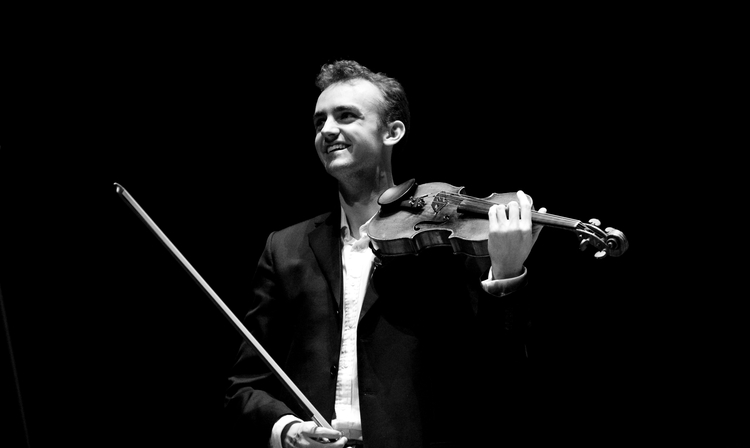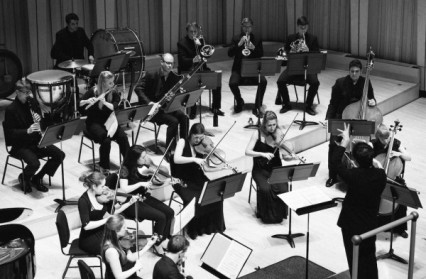The Riverfront, Newport, 19 March 2016
Stravinsky: Danses Concertantes
Beethoven: Violin Concerto in D Op 61
Mozart: Symphony No 41 in C (The Jupiter)
Conductor, Gareth Jones
Benjamin Baker (violin)
Coming of age is unaccountably marked by 21 years, not that it stops the young musicians of Sinfonia Cymru celebrating its 20th birthday this year. Twenty is a round number for a rounded achievement, the orchestra having realised its ambition of providing a career start for young professionals with a lot of control over what they play and how they operate as a unit. Having begun its early years with inevitable changes in the ranks as musicians discover where their careers might lie, the membership is now settled and composed, with the orchestra’s founder and conductor, Gareth Jones, still wielding the baton. The latest concert tour featured new guest leader Benjamin Baker as soloist.
Almost every orchestral work written by Stravinsky could be choreographed, and not just because his great ballet scores suggest an ever-present leaning towards the dance. George Balanchine, who stepped the work for the Ballets Russes, believed that the organising of rhythm on a grand scale was a function of the musical mind and that Stravinsky was ‘the supreme example of its most subtle and varied effects’. He would have known. At this concert (reviewed at the Riverfront, Newport following a short tour to Cardiff and Pontyberem, to finish in Mold the following day), it was given to Sinfonia Cymru to prove the point, up to a point, without the need to be hidden while a ballet corps legged it on stage. Danses Concertantes is specifically a chamber work commissioned as a concert piece. Despite the terpsichorean associations, the work could be construed as a concerto for orchestra but without ostentation – a concerto for small orchestra, then. It’s also one of those works now in Sinfonia Cymru’s repertory with which Gareth Jones illustrates how well his musicians deal with the transparency of chamber writing and their ability to aerate its textures. His instrumentation was exactly that stipulated by the composer. And such ability has to be sustained: Stravinsky never lets up in exposing one and all. His syncopations and polka proliferations were despatched here with vitality moderated by studied concentration, the journey offering what amounted to solo opportunities confidently taken, not least by the orchestra’s leader for this tour, Caroline Pether.

New Zealander Benjamin Baker was the soloist in Beethoven’s Violin Concerto, the orchestra expanding accordingly. In a performance of cool assurance, he sounded part and parcel of the band, having already led its Strauss series in 2014 and performed with it at the Bristol Proms last year. He early settled on a particular emotional register and stuck to it. If the result was less flamboyant than one might have been used to, it was a change to hear a version that sounded as though it were emerging from the orchestra. In this work, the soloist has to wait a while before uttering a sound. And if the complex first movement seemed longer than usual it was because the conductor refused to be rushed and the soloist rejected some of the more vulgar first-movement cadenzas for the one re-cast by violinist Christian Tetzlaff from the piano cadenza Beethoven wrote in his version of the concerto for piano and orchestra (and which, according to some, including Tetzlaff himself, wanders a tad off beam). But Tetzlaff retains the timpani in his cadenza, creating a timely echo of its solo at the concerto’s start. Thus, nothing seemed likely to take the audience by surprise, except Beethoven’s exuberance in the last movement, which is always a pleasant one. Benjamin Baker’s even and unforced tone and his easy interplay with clarinet and bassoon were a mark of the second movement, its almost leisurely tempo just right for giving out the theme’s four statements, the last a full-blown tutti before a second, strings-accompanied theme heralds the final rondo, its cadenza also by Tetzlaff. Good to see Benjamin Baker keeping up with the latest ideas.
Gareth Jones is an instinctive Mozartian: witness his conducting at Welsh National Opera of The Magic Flute in one of its most effective stagings, and his communication of that understanding to the ranks of this orchestra. There was more than a touch of the operatic about his account of the ‘Jupiter’ Symphony, a kind of pit cajoling in a piece of music that already buzzes with ‘operatic’ activity. The art is to make the sound bristle with movement without letting it run away from you. Emerging like a rocket out of the minor-mode louring of its predecessor, the ‘Jupiter’ wants to be up and away as the composer’s last word on symphonies, but not before discharging the first movement’s striking melodies, the second’s elegance and the fourth’s humdinging counterpoint. There are stresses on content in the second that Jones did not miss – especially the structural ambiguities in the minuet and trio – and the seemingly effortless playing mirrored the effortlessness of the composition. Any unravelling of these intricacies can be missed by inattentive listening or hasty performance. We were given time to marvel and enjoy, but not at the expense of the work’s movement onwards and upwards. Not much more could be asked of a conductor and an orchestra, especially when there’s a (more or less) five-part counterpoint to be enjoyed en route to Olympus.



 Enjoyed this article? Support our writers directly by buying them a coffee and clicking this link.
Enjoyed this article? Support our writers directly by buying them a coffee and clicking this link.







